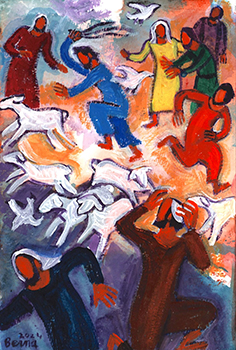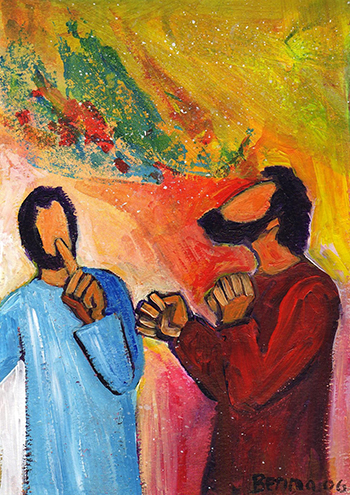From Our Archives
Debie Thomas, Lord of the Sabbath (2018).
For Sunday June 2, 2024
Lectionary Readings (Revised Common Lectionary, Year B)
Psalm 139:1-6, 13-18
2 Corinthians 4:5-12
Mark 2:23-3:6
This Week's Essay
I've spent a lot of time this week thinking about an angry Jesus. We don't normally think of anger as a virtue. It's even one of the seven deadly sins. But there it is, front and center, in Mark 3:5 for this week. When Jesus asked if it was lawful to heal on the Sabbath, his accusers "remained silent." Jesus then "looked at them in anger, grieved at their hardness of heart." And in response to his anger, his detractors "began to plot how they might kill Jesus."
Mark's gospel begins with Jesus abandoning his family to join the sectarian movement of his eccentric cousin John in the desert, where he challenged the religious and political status quo with his anti-establishment message. In response, Jesus's family tried to apprehend him as insane. The village of Nazareth tried to kill him by pushing him off a cliff.
Peter, Andrew, James and John likewise left their families to follow Jesus. Rumors about Jesus "spread quickly." At one house "the whole town gathered at the door," the crush of craziness so great that "Jesus could no longer enter a town openly." In Capernaum, a crowd ripped off the roof of a house to get to Jesus inside. Jesus embraced a Jewish traitor who collected taxes for the Roman oppressors, and, in fact, befriended "many tax collectors." He flaunted purity rituals, fasting, and the Sabbath in ways that seemed to undermine the Ten Commandments.
And so, by Mark 3:5 for this week, Jesus explodes in anger, and his detractors plot to kill him. That's a lot of chaos and confrontation in barely three chapters.
 |
|
Bernadette Lopez, Jesus Cleanses the Temple.
|
In fact, there are six times in Mark when Jesus gets angry. Mark 3:5 is actually the second episode. The first outburst is in 1:41, and it requires some detective work about an important textual variant. If the anger of Jesus shocks us today, there's consolation in knowing that it definitely upset some copyists of the original Greek manuscript of Mark.
A vast majority of the Greek manuscripts and English translations of Mark 1:41 read that Jesus was "moved with compassion" when he healed the leper. But if you have a good study Bible, you'll probably see a footnote about a different manuscript tradition that reads that Jesus was "moved with anger." Whereas most of the hundreds of differences in the thousands of Greek and Latin manuscripts are incidental, accidental, and inconsequential — like a misspelled name, or a word that is wrongly repeated or omitted, the textual variant in Mark 1:41 is huge, and it was deliberate.
So, which variant is Mark's original text? Did a scribe change "anger" to "compassion," or the other way around? The "feel good" reading is obvious, that Jesus healed out of compassion.
But it's even more complicated. There's a second text tradition that does not contain either word. That's what you will read in the parallel accounts in Matthew 8:3 and Luke 5:13: Jesus simply "stretched out his hand, and touched him," with neither compassion nor anger.
That leaves us with a third option — a single manuscript called Codex Bezae that reads that Jesus healed "out of anger." I think this variant is Mark's original wording, based on two important criteria in textual criticism. First, a more improbable reading is usually considered the true and original text. Most readers find the anger of Jesus more improbable than his compassion.
 |
|
Bernadette Lopez, Jesus Cleanses the Temple.
|
Second, textual critics prefer the reading that best explains the alternative. In this case, I find it hard to imagine a copyist changing "compassion" to "anger." That makes no sense. But it's easy to imagine a conscientious scribe who was disturbed or embarrassed by an angry Jesus making him compassionate by changing a single word. And later scribes would have understandably kept repeating the mistake of copying "compassion" because it was far more palatable.
So, in both Mark 1:41 and 3:5, Jesus healed people "filled with anger." But why the anger? Maybe he didn't like the leper asking for a miracle, that his faith alone should have been sufficient. Maybe Jesus got angry because he told the leper to keep his identity a secret, but he did just the opposite. It's easy to imagine that Jesus got angry out of grief and compassion for our painful human condition, and at how the uncaring people in these stories placed religious rules above human need.
Whatever the case, Jesus got angry. And he got angry four more times in Mark.
In Mark 7:34 (cf. 8:12) he "looked to heaven with a deep sigh" as he healed a man who was deaf and dumb. Perhaps this is more akin to grief. In 9:19 he scolded the crowd as an "unbelieving generation; how long shall I put up with you?" I try to place myself in that story and imagine how I would feel if Jesus said that directly to me. He became "indignant" in 10:13 when his own disciples rebuked people for bringing little children to him "that he might touch them." And he got scary angry when he "cleansed the temple" in Mark 11.
Beyond the gospel of Mark, Jesus excoriated the religious professionals as hypocrites, blind guides, fools, serpents, whitewashed tombs, and a brood of vipers — literally, "off-spring of snakes," and thus in some translations he called them "snake bastards" (Matthew 23). And finally, when Jesus healed Lazarus he was "deeply moved" and wept (John 11).
 |
|
Bernadette Lopez, Jesus and his disciples enter Capernaum.
|
I realize that I got into the weeds of text criticism with Mark 1:41, but I did so for an important reason — however well intended, the copyist who changed "anger" to "compassion" reminds us how easy it is to sanitize and sentimentalize Jesus, to turn him into the meek and mild savior of Sunday School flannel graphs (remember those?). Similarly, the anger of Jesus in the "cleansing of the temple" challenges all our self-serving projections. The anger of Jesus warns us of what Donald McCullough calls "the dangerous illusion of a manageable deity."
It is a commonplace among biblical scholars that if we could somehow get behind the later and highly stylized "Christ of faith," and discover the earlier and unadulterated "Jesus of history," we'd understand him better. But I like the counterintuitive perspective of the historian Garry Wills in his book What Jesus Meant. He argues that when we discover the "real" historical Jesus, he becomes more rather than less mysterious to us. I think that's exactly what happens with the anger of Jesus in Mark — he becomes even more mysterious to us. In her book Reading Jesus, Mary Gordon calls him the "irresistible incomprehensible."
Finally, since I am a professionally paid religionist, and much of the anger of Jesus was directed at people like me, I'm reminded of the insight of Richard Holloway's book A Little History of Religion. A recurring theme for Holloway is what he calls "the most important insight into God ever discovered by humans" — the Second Commandment prohibition against idolatry. Holloway notes that "its real target was religion. And not just the kind that got people dancing around a golden calf. It was warning us that no religious system could capture or contain the mystery of God. Yet in history, that's exactly what many of them would go on to claim. The Second Commandment was an early warning that the organizations that claimed to speak for God would become God's greatest rivals, the most dangerous idol of them all."
Weekly Prayer
Daniel Berrigan
Heal us Jesuits; the overly content, the malcontent,
the skilled and sere of heart, the secret weepers,
the self-defeated, the defaulters, the proud of place
drinking the empty wind of honor. Help the workhorses
slow; speed the laggards, give back to routine and rote
their lost soul.
Institution, constitution, order, law—O
kiss the dead awake!
Your Holy Spirit, come!From Daniel Berrigan, And the Risen Bread; Selected Poems, 1957–1997 (1998). From Wikipedia: "Saint Peter Claver (1581–1654), S.J., was a Spanish Jesuit priest and missionary born in Verdú who, due to his life and work, became the patron saint of slaves, the Republic of Colombia and ministry to African Americans."
Dan Clendenin: dan@journeywithjesus.net
Image credits: (1) Pewboy.net; (2) Evangile et Peinture; and (3) Evangile et Peinture.





